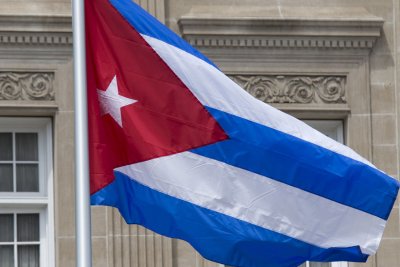
Aug. 13 (UPI) — The U.S. State Department on Wednesday imposed visa restrictions on foreign government officials accused of assisting the Cuban regime in a scheme exploiting medical professionals.
Officials from several African nations, Cuba Grenada were sanctioned in a State Department news release. Then later Wednesday, several Brazilian government officials and former Pan American Health Organization officials were targeted for their work with Brazil’s More Doctors program. In all situations, their family members are also affected.
“We are committed to ending this practice,” Secretary of State Marco Rubio posted on X after the African and Grenadian officials were sanctioned. “Countries who are complicit in this exploitative practice should think twice.”
After Brazilians were named, Marco wrote on X: “Mais Médicos [Spanish for More Doctors] was an unconscionable diplomatic scam of foreign ‘medical missions.'”
Cuba is accused of sending the workers to some 50 countries for little or no pay for long hours, keeping their passports, confiscating medical credentials, and subjecting them to surveillance and curfews. Many of them reported being sexually abused by their supervisors. If they left the program, they faced repercussions.
Rubio said “several” African nations were sanctioned. Marco and the news release didn’t name that continent’s countries or the officials involved there, as well as Cuba and Grenada.
But the release about Brazil named: Mozart Julio Tabosa Sales and Alberto Kleiman, who worked in the nation’s Ministry of Health, played a role in planning and implementing the New Doctors program.
These officials used PAHO as an intermediary with the Cuban regime to implement the program “without following Brazilian constitutional requirements, dodging U.S. sanctions on Cuba, and knowingly paying the Cuban regime what was owed to Cuban medical workers,” according to the release.
In the described scheme, they were complicit with the Cuban government, in which medical professionals were “rented” by other countries at higher prices, with most of the revenue kept by the Cuban authorities, the State Department alleged.
They were involved in “depriving the Cubans of essential care,” the State Department said.
“The United States continues to engage governments, and will take action as needed, to bring an end to such forced labor,” the first release said. “We urge governments to pay the doctors directly for their services, not the regime slave masters.”
The federal agency urged governments to end this method of forced labor.
In June, the U.S. agency imposed visa restrictions on unspecified Central American government officials for being involved in the medical mission program.
Rubio at the time described a similar scheme in which “officials responsible for Cuban medical missions programs that include elements of forced labor and the exploitation of Cuban workers.”
In June, Havana’s foreign minister, Bruno Rodriguez, said the visa restrictions were “based on falsehoods and coercion.”
In late May, the State Department suspended the applications for J-1 visas, which allow people to come to the United States for exchange visitor programs. One week later, the department resumed visa interviews, but people seeking the visas were required to make their social media accounts public.
This year, more than 6,600 non-U.S. citizen doctors were accepted into residency programs, according to the National Resident Matching Program. Many residents go into underserved communities because they are less popular among U.S. applicants.
Medical professionals comprised 75% of Cuba’s exported workforce, generating $4.9 billion of its total $7 billion in 2022, according to the State Department’s 2024 Trafficking in Persons Report.
“Traffickers exploit Cuban citizens in sex trafficking and forced labor in Africa, Asia, the Caribbean, the Mediterranean, Latin America and the United States,” the report said.”
Simultaneously, the U.S. government has fully restricted and limited people from 12 foreign countries in June. Cuba was among seven nations with restricted and limited entry.
“These restrictions distinguish between, but apply to both, the entry of immigrants and nonimmigrants,” the order states about the two designations,” a proclamation by President Donald Trump reads.
Trump issued the ban on nationals from Afghanistan, Burma, Chad, Republic of the Congo, Equatorial Guinea, Eritrea, Haiti, Iran, Libya, Somalia, Sudan and Yemen. Also partial restricted were those form Burundi, Laos, Sierra Leone, Togo, Turkmenistan and Venezuela.